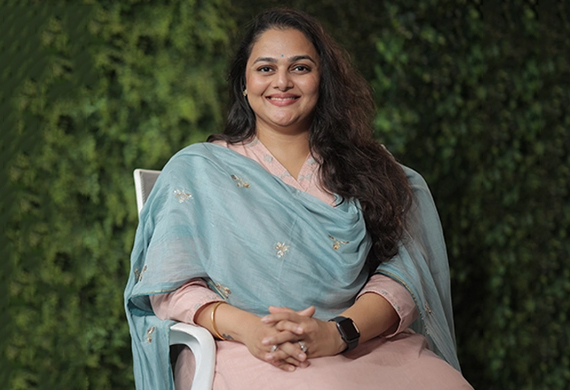
Empowering Women in India: The Transformative Role of Education
By: Dr. Maithili Tambe, CEO, The Academy School (TAS), Pune | Wednesday, 6 March 2024
Dr. Maithili Tambe’s belief that a happy child is a successful one led her to her position as CEO of TAS.. Founded 2015 by the Gramodaya Trust, TAS provides world class education to the children in Maharashtra. As an educator, Dr Maithili’s vision/mission is to develop well rounded, confident, and responsible individuals who aspire to achieve their full potential.
On the occasion of International Women’s Day, Dr Maithili Tambe, CEO, The Academy School (TAS), Pune sheds light on the key role education can play in empowering the women of India. Although the challenges still persist, yet the need of the hour is to break the barriers and educate our women.
In many areas of India, women still face numerous challenges that prevent them from realizing their full potential. Discrimination, gender bias, and poverty often limit their access to education and job opportunities, leaving them at a disadvantage. Women make up half of India's population and their potential, when unlocked through education and opportunities, can drive significant social and economic change. In a country where traditional gender roles and societal norms have often limited women's access to education and opportunities, empowering women is a vital step towards creating a more inclusive and equitable society. By investing in women's education, we are not only investing in individual women but also in the future generations they will nurture and influence.
Current State of Women's Education in India
Over the years, there have been significant advancements in promoting education for girls and women in India. Initiatives such as the Right to Education Act and Beti Bachao, Beti Padhao campaign have aimed to address gender disparities in education and increase female enrollment rates. Despite these efforts, disparities still exist, particularly in rural and marginalized communities. Factors such as poverty, cultural norms, early marriage, and lack of access to quality education facilities continue to hinder girls' education in many parts of the country. According to statistics, the female literacy rate lags behind the male literacy rate, with a significant gender gap in certain regions. However, there is growing recognition of the transformative role of education in empowering women and driving social change.
Impact of Education on Women's Empowerment
Education serves as a catalyst for transformative change, breaking through societal barriers and fostering gender equality. Access to education equips women with the tools to challenge traditional gender roles and stereotypes. It empowers them to pursue higher studies, enter the workforce, and become financially independent. Education opens doors to opportunities and enables women to participate more actively in social, economic, and political spheres. Educated women are better equipped to advocate for their rights, resist discrimination, and contribute to community development. They become agents of change, inspiring future generations and reshaping societal norms.
Breaking Barriers: Challenges Faced by Women In Accessing Education
Deep-rooted societal norms and traditions often prioritise boys' education over girls', leading to a significant gender disparity in educational opportunities. Cultural beliefs that perpetuate gender stereotypes limit girls' access to schooling, with many families favouring early marriage for their daughters over investing in their education. Safety concerns, particularly in rural areas, pose a significant barrier to girls attending school, with the fear of harassment or violence deterring families from allowing their daughters to travel long distances to access education.
Limited infrastructure and inadequate facilities in schools, such as lack of separate sanitation facilities for girls, contribute to the challenges faced by women in pursuing education. These barriers not only restrict women's personal development and opportunities but also perpetuate cycles of poverty and inequality within society.
Link Between Education & Economic Empowerment for Women
When women are educated, they are better equipped to make informed decisions about their lives, health, and finances. Education provides women with the knowledge and skills needed to participate in the workforce, start businesses, and contribute to the economy. Education helps women break free from traditional gender roles and societal norms that may limit their opportunities for economic independence. By investing in girls' education, we are not only investing in their future but also in the future of their families, communities, and the nation as a whole. In India, initiatives focused on girls' education have shown promising results in narrowing the gender gap and promoting economic empowerment. By providing girls with quality education, we are laying the foundation for a more inclusive and prosperous society. Education is not just a tool for personal growth; it is a catalyst for social change and economic development.
Overcoming Social Norms & Cultural Barriers
In many parts of India, women are still expected to prioritise household duties and caregiving roles over pursuing their education or career aspirations. Challenging these deeply ingrained beliefs requires a multifaceted approach that involves grassroots activism, community engagement, government policies, and educational initiatives. By promoting gender equality and advocating for girls' education, individuals and organisations can help shift societal perceptions and dismantle barriers that hinder women's progress. When women are educated and empowered to fulfill their potential, they become agents of change who can contribute to building a more inclusive and equitable society.
Educated women are more likely to challenge gender stereotypes, advocate for gender equality, and participate in decision-making processes at all levels. In essence, education is not just a tool for learning but a powerful catalyst for social change and empowerment. As we continue to prioritise and invest in education for women in India, we are not only shaping a brighter future for individuals but also creating a more progressive and prosperous society for generations to come. Education has proven to be a powerful tool in empowering women in India. Through education, women are not only gaining knowledge and skills but also breaking barriers, challenging stereotypes, and paving the way for a more gender-equal society.






